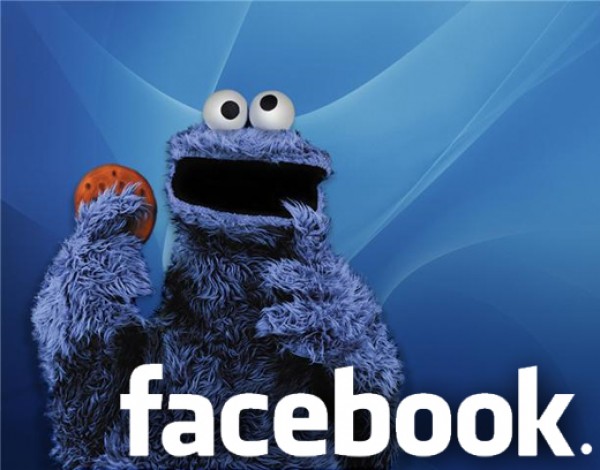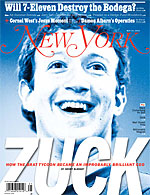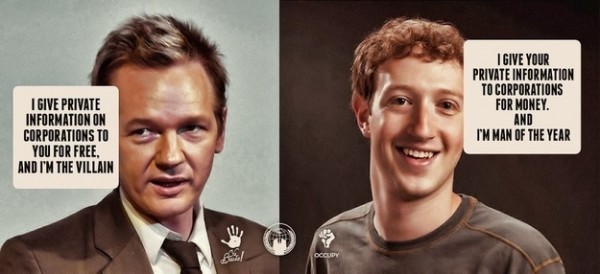
NEW YORK MAGAZINE: Which brings us back to the question: Have we reached peak Facebook? And no, we haven’t. Even if Facebook never adds another user, it will keep growing: It has become a fundamental substrate, a difficult-to-avoid component of any site or app that requires users to register—making it essential to nearly every major web innovation now and in the future. There’s a related question: Is Facebook ever going to be cool again? That’s like asking “Is the phone company cool?” The interface may not be exciting anymore, but the network is very, very cool, in the disruptively awesome way that enormous things are: volcanoes, aircraft carriers, the New Deal. Peak Facebook, when it does arrive, is something that Facebook-haters should fear, not welcome. Facebook’s platform has been so overwhelmingly successful that the company hardly had time to do anything but grow. Yet when the growth of the network itself slows, as it too inevitably will, Facebook—as a publicly traded leviathan whose mandate is to increase profits—will need to find new ways of slicing and dicing humanity into groups that will respond to marketing. That’s what lurks on the other side of peak Facebook, and it is going to suck. MORE
RELATED: If all goes as planned, Facebook will finally pull the trigger later this month on its  long-salivated-over IPO. The deal could value the company in the neighborhood of $100 billion, making founder and CEO Mark Elliot Zuckerberg’s own unusually large stake worth $25 billion. It is a huge sum, even in context. Zuckerberg’s impending fortune is more money than Wal-Mart’s 10,000-plus stores made last year. It’s more than Wall Street paid in bonuses to New Yorkers last year. And it has been amassed in only eight years by a 27-year-old who not long ago passed out business cards reading “I’m CEO, bitch.” The Zuckerberg most people know is the one depicted by The Social Network: nerdy, insecure, and shady—in no way a mature adult who’s earned such massive wealth. His awkward public appearances over the years have not improved that impression. Zuckerberg may have written the original code for Facebook, the common view of him goes, but the company’s success since then—the service is now used by nearly one-eighth of the world’s population—has come more despite him than because of him. He was just in the right place at the right time. But this view sells Zuckerberg massively short. Getting a company to grow as fast as Facebook has is extraordinarily difficult, even when users do a lot of the work. It’s even more challenging when you go in having never raised so much as a dollar from investors or managed a single employee, and you’re fighting to stay ahead of some of the richest, most aggressive, and most talented companies in the world. Mark has done two things in his twenties,” a colleague of Zuckerberg says. “He has built a global company, and he has grown up.” The second one made the first possible. MORE
long-salivated-over IPO. The deal could value the company in the neighborhood of $100 billion, making founder and CEO Mark Elliot Zuckerberg’s own unusually large stake worth $25 billion. It is a huge sum, even in context. Zuckerberg’s impending fortune is more money than Wal-Mart’s 10,000-plus stores made last year. It’s more than Wall Street paid in bonuses to New Yorkers last year. And it has been amassed in only eight years by a 27-year-old who not long ago passed out business cards reading “I’m CEO, bitch.” The Zuckerberg most people know is the one depicted by The Social Network: nerdy, insecure, and shady—in no way a mature adult who’s earned such massive wealth. His awkward public appearances over the years have not improved that impression. Zuckerberg may have written the original code for Facebook, the common view of him goes, but the company’s success since then—the service is now used by nearly one-eighth of the world’s population—has come more despite him than because of him. He was just in the right place at the right time. But this view sells Zuckerberg massively short. Getting a company to grow as fast as Facebook has is extraordinarily difficult, even when users do a lot of the work. It’s even more challenging when you go in having never raised so much as a dollar from investors or managed a single employee, and you’re fighting to stay ahead of some of the richest, most aggressive, and most talented companies in the world. Mark has done two things in his twenties,” a colleague of Zuckerberg says. “He has built a global company, and he has grown up.” The second one made the first possible. MORE
Curated News, Culture And Commentary. Plus, the Usual Sex, Drugs and Rock n' Roll

